When it comes to camping, there are various options available to outdoor enthusiasts. Among these options, two popular choices are SUV tent camping and traditional camping.
SUV tent camping involves utilizing a sport utility vehicle (SUV) as a base for camping activities, while traditional camping typically involves using tents or other portable shelters.
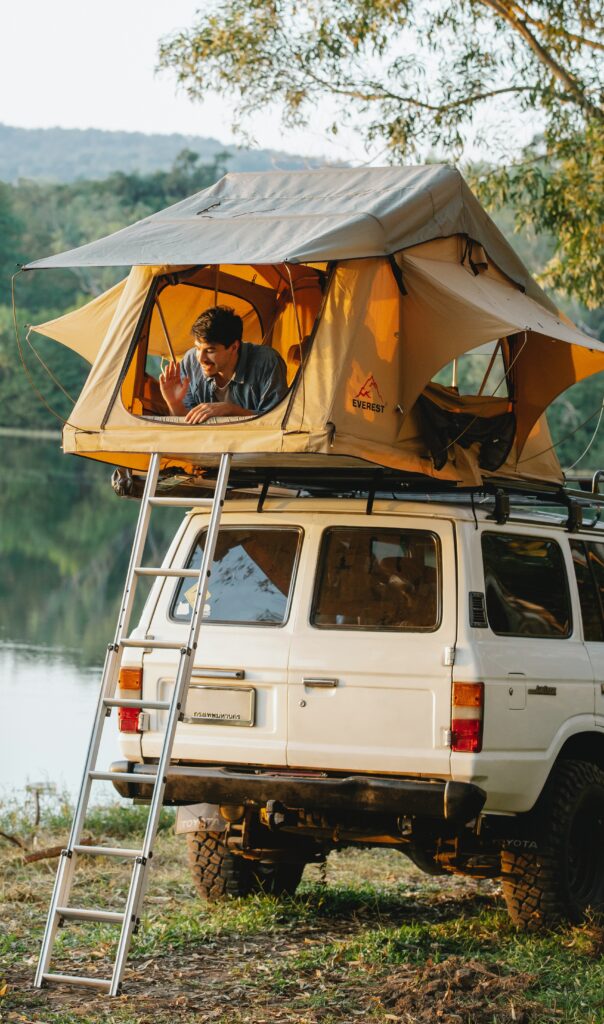
Photo by Uriel Mont
Each option has its own set of advantages and disadvantages, and choosing the right one depends on individual preferences and priorities.
In this article, we will explore the differences between SUV camping and traditional camping, highlighting factors such as location, equipment, comfort and convenience, activities and entertainment, as well as the cost.
By examining these aspects, you can make an informed decision about which camping style suits you best.
Differences Between SUV Camping and Traditional Camping
When considering the various options for camping, it is important to understand the fundamental differences between SUV camping and traditional camping. Each style offers a distinct experience, catering to different preferences and needs.
By exploring these disparities, you can make an informed decision about which type of camping aligns best with your desired adventure.
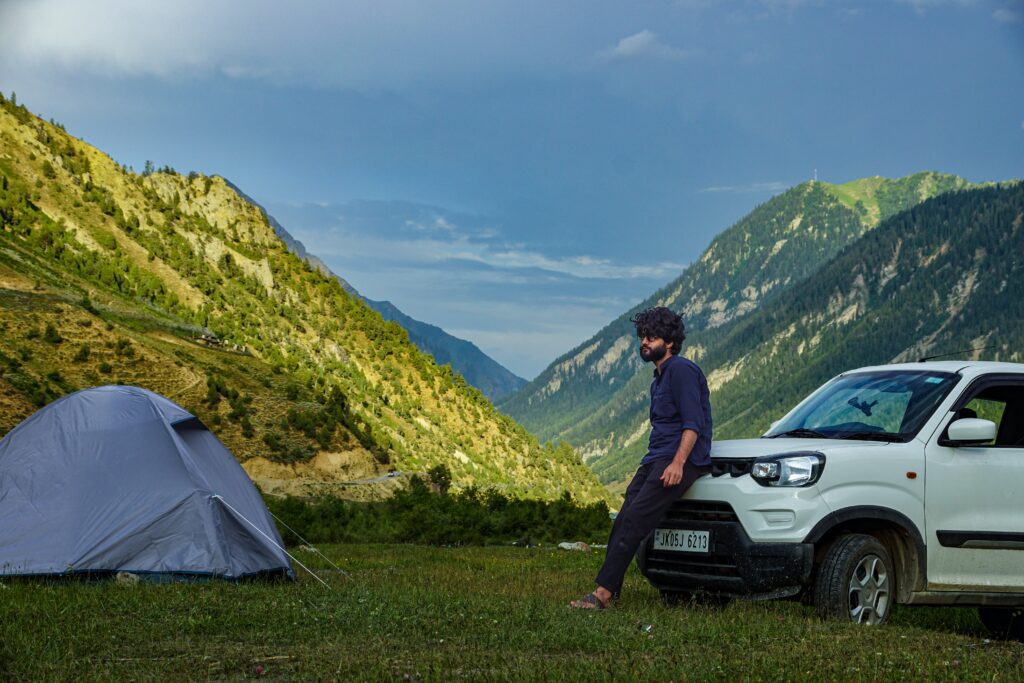
Photo by Ruhit Ramzan:
Your choice of camping style can significantly impact your camping experience. Hence, it’s essential to understand the contrasting aspects of these two camping styles to make an informed decision about which one is right for you.
1. Location
One key distinction between SUV camping and traditional camping is the freedom of location selection. SUV camping provides greater flexibility in choosing your camping spot. It grants easy access to remote and off-road areas that may pose challenges for traditional camping equipment.
With SUVs designed to navigate rugged terrains, campers can explore less-explored wilderness areas and discover hidden trails and breathtaking landscapes.
In contrast, traditional camping is typically limited to established campgrounds, which may lack the rugged charm and seclusion offered by remote locations.
Ultimately, the choice of location depends on individual preferences, with SUV camping offering a sense of adventure and access to uncharted territories, while traditional camping provides convenience and amenities in established campgrounds.
Thus, the location of where you’re going camping has an important effect on the suitability of traditional camping or SUV camping. Therein, SUV camping offering a sense of adventure and access to uncharted territories, while traditional camping provides convenience and amenities in established campgrounds.
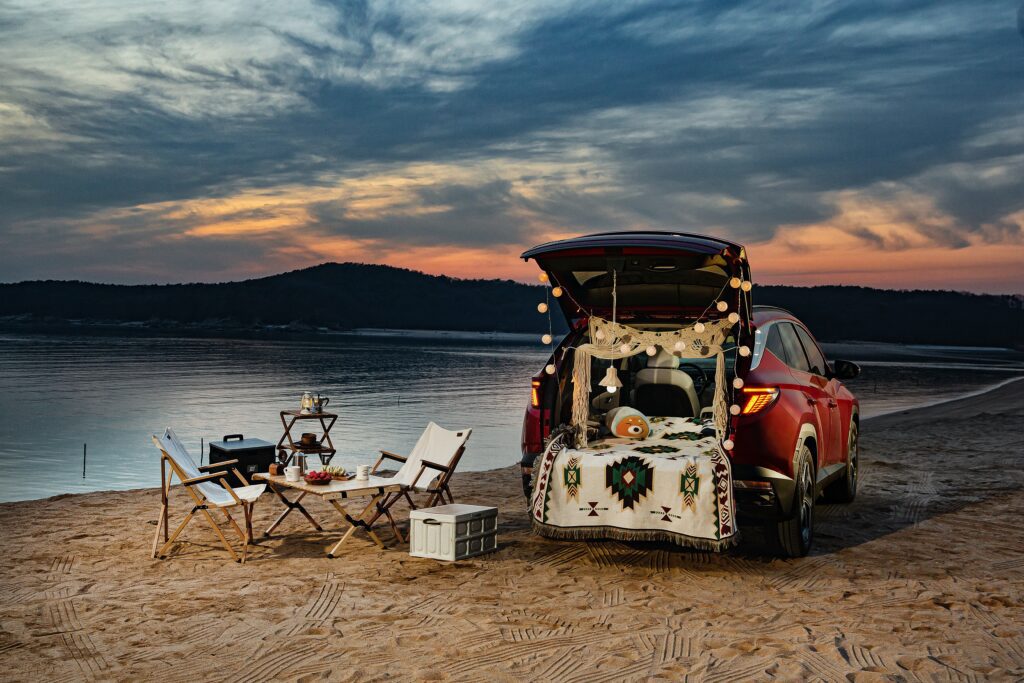
Photo by: Hyundai Motor Group
Accessibility
Accessibility is another factor to consider when comparing SUV camping to traditional camping. SUVs provide a higher level of accessibility due to their ability to transport you and your gear directly to your campsite.
You can park your SUV near your chosen camping spot, eliminating the need to carry heavy equipment over long distances. This convenience can be particularly beneficial for individuals with physical limitations or families with young children.
In contrast, traditional camping typically requires hiking or carrying gear to reach the campsite, which can be challenging and time-consuming, especially when camping with a large group or carrying bulky items.
Environment
The environment in which you choose to camp is an essential consideration. SUV camping allows you to experience the great outdoors while enjoying the comfort and security of your vehicle.
This can be advantageous in regions with extreme weather conditions or when camping in areas with potentially dangerous wildlife. Your SUV acts as a shelter, protecting you from the elements and providing a sense of safety.
Conversely, traditional camping allows you to become fully immersed in nature. Sleeping in a tent and cooking over a campfire can create a more authentic camping experience. It allowing you to connect with the natural surroundings in a way that SUV camping might not provide.
2. Equipment
When it comes to camping, having the right equipment is essential for a successful and enjoyable outdoor experience. In this section, we will delve into the various equipment requirements for both SUV camping and traditional camping.
By examining the differences in equipment needs, you can ensure that you’ll be able to make the most of your camping adventure. So, let’s explore the equipment aspect and discover how these two camping styles differ when it comes to the gear needed for a comfortable and convenient outdoor stay.

Photo by Uriel Mont
Tent and Sleeping Gear
When it comes to camping, the equipment you use plays a significant role in your overall experience. Here, we will examine the differences in equipment requirements between SUV camping and traditional camping, focusing on tent and sleeping gear as well as cooking and food storage.
In SUV camping, the need for a tent is significantly reduced or eliminated altogether. Instead, you can utilize the spacious interior of your vehicle as your sleeping area. Many SUV models come with foldable rear seats, allowing you to create a comfortable sleeping space.
This can eliminate the hassle of setting up a tent, making this a time-saving and convenient option. Especially for those who prefer a quick setup and don’t want to deal with the complexities of tent assembly.
However, it’s important to note that sleeping in an SUV may not provide the same level of ventilation and insulation as a well-designed tent.
In traditional camping, a tent is a necessity. Tents come in various sizes and designs, allowing you to choose one that suits your specific needs. They provide protection from the elements, privacy, and a designated sleeping area.
Additionally, traditional camping requires sleeping gear such as sleeping bags, sleeping pads, and pillows. These items can contribute to your overall comfort and warmth while sleeping outdoors.
Cooking and Food Storage
In the realm of SUV camping, the availability of storage space within your vehicle proves advantageous for the more efficient organization of cooking equipment and food supplies.
Furthermore, many SUV models are equipped with convenient features such as foldable tables, built-in storage compartments, and even small kitchens or refrigerators. These amenities not only make meal preparation more convenient but also enhance the overall camping experience.
This setup is particularly beneficial for longer camping trips or when camping in remote areas where access to grocery stores or restaurants is limited.
With the ability to store perishable food items and cook meals on the go, SUV camping provides a level of convenience and self-sufficiency that traditional camping may struggle to match.
Ultimately, the availability of storage space in SUV camping revolutionizes the way you approach cooking, food storage, and overall organization, making it a practical and appealing option for campers seeking convenience and efficiency.
Traditional camping typically involves cooking over a campfire or using portable camping stoves. You would need to bring your own cooking equipment, such as pots, pans, utensils, and a cooler for food storage.
Traditional camping allows for a more traditional cooking experience, with the aroma and crackle of a campfire adding to the overall ambiance. However, it requires more planning and packing to ensure you have all the necessary cooking supplies and perishable food items.
3. Comfort and Convenience
When deciding between SUV camping and traditional camping, considering comfort and convenience is crucial. Here, we will explore the differences in terms of space and storage, as well as shower and bathroom facilities.
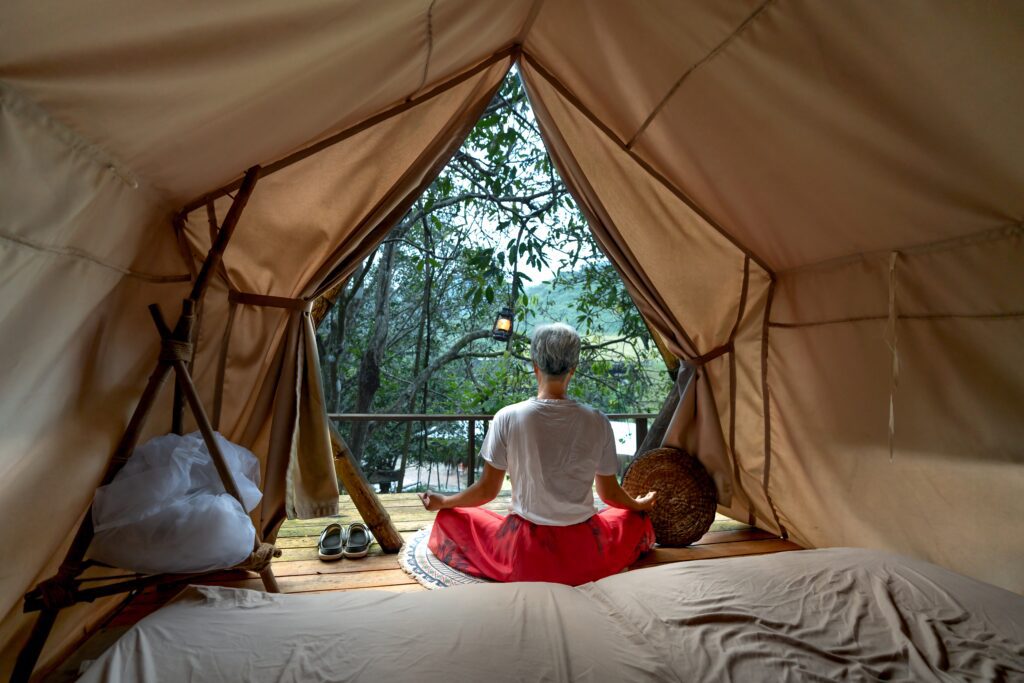
Photo by Quang Nguyen Vinh
Space and Storage
SUV camping offers the advantage of ample space and storage options. Most SUV models have spacious interiors that can accommodate camping gear, personal belongings, and even additional seating or sleeping areas if needed.
This provides a higher level of comfort and convenience, as you can keep your belongings organized and easily accessible. The extra space also allows for greater flexibility in terms of bringing along recreational equipment such as bicycles, kayaks, or fishing gear.
In traditional camping, space is more limited. Tents provide a designated sleeping area, but they often have limited room for storing personal items. You may need to rely on separate storage containers or bags to keep your gear organized and protected from the elements.
Additionally, the size and weight of your camping equipment will determine how much you can bring with you. This is an important factor to consider if you have specific comfort requirements or need to accommodate a larger group.
Shower
Personal hygiene and cleanliness are important considerations during any camping trip. In SUV camping, access to shower facilities may be limited or nonexistent, depending on the location. Some SUV models offer the option of attaching a portable shower system, allowing you to enjoy a refreshing shower outdoors.
However, this requires additional equipment and water supply. Alternatively, you may need to rely on public or campground showers if available in the area.
Traditional camping often involves using campground facilities, such as communal shower blocks or designated water sources for bathing. Note these facilities may vary in terms of cleanliness and convenience.
Still, they generally provide a dedicated space for showering and maintaining personal hygiene. Although, if you’re camping in a remote area, access to shower facilities may be non-existent.
Bathroom
Addressing bathroom needs is another consideration when comparing SUV camping and traditional camping. In SUV camping, access to a toilet can be a challenge, especially in remote locations. Some SUV models offer the option of portable toilets, but these require regular maintenance and disposal.
Depending on the duration and location of your camping trip, you may need to rely on natural surroundings and follow Leave No Trace principles for bathroom needs.
Conversely, traditional camping often relies on campground facilities, which typically include public restrooms or pit toilets. These facilities provide a designated space for using the toilet and are generally more accessible and convenient compared to SUV camping.
However, similar to shower facilities, the availability and cleanliness of these facilities can vary depending on the location and the level of development of the camping area.
4. Activities and Entertainment
Engaging in activities and entertainment is a crucial aspect of any camping experience, offering opportunities for relaxation, exploration, and enjoyment amidst the natural surroundings.
Whether you prefer outdoor recreation or indoor leisure, both SUV camping and traditional camping offer a range of activities to cater to different interests and preferences.
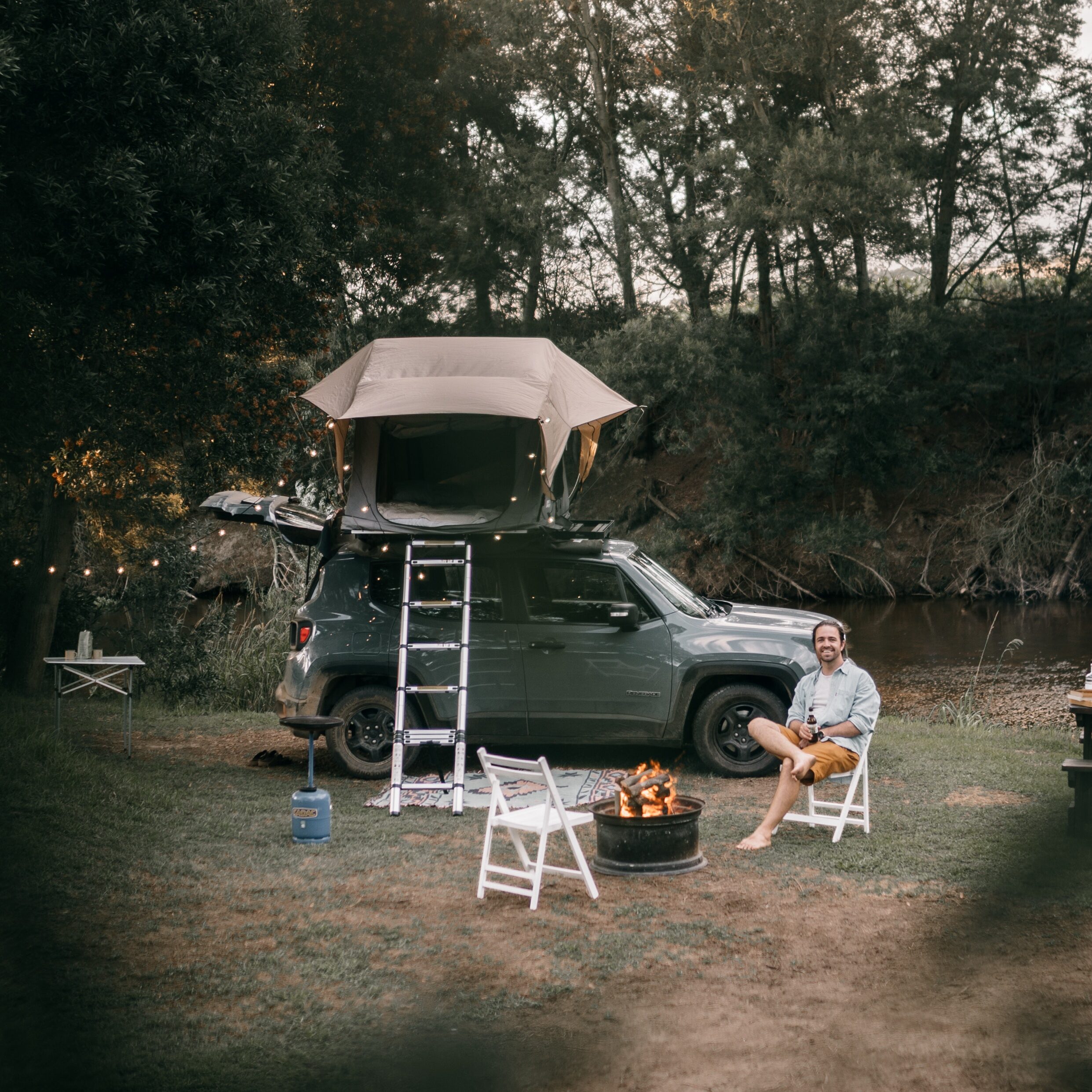
Photo by Taryn Elliott
Outdoor Recreation
SUV camping provides the advantage of easy access to outdoor activities. With an SUV, you can explore off-road trails, go hiking or biking in remote areas, or engage in water sports if you’re near a lake or river.
The flexibility and mobility of an SUV allow you to venture into different natural landscapes and discover hidden gems. This can be particularly appealing to adventure enthusiasts and those seeking to escape the crowded campgrounds.
In traditional camping, outdoor recreation options may be limited to the immediate surroundings of the campsite or the amenities offered by the campground. This could include activities such as hiking, fishing, swimming, or simply enjoying nature.
While traditional camping may not offer the same level of mobility as SUV camping, it still provides opportunities to connect with the outdoors and engage in various recreational pursuits.
Indoor Activities
SUV camping may provide limited options for indoor activities compared to traditional camping. The interior space of an SUV is primarily designed for transportation and sleeping, leaving little room for recreational activities during inclement weather or downtime.
However, some larger SUV models may offer more space and seating options, allowing for board games, reading, or other indoor activities.
Traditional camping provides the flexibility to create your own indoor activities within the confines of your tent or camping shelter. This could involve playing card games, reading books, storytelling, or simply enjoying the company of fellow campers.
Additionally, if you’re camping in an established campground, there may be communal areas or recreation rooms where you can socialize and engage in indoor activities during unfavorable weather conditions.
5. Cost
Considering the financial aspect of camping is crucial for many individuals. Evaluating the initial investment as well as the maintenance and upkeep costs can help determine which camping style aligns with your budget.

Photo by Christine Roy
Initial Investment
SUV camping generally requires a higher initial investment compared to traditional camping. Purchasing an SUV specifically designed for camping or modifying an existing SUV with camping accessories can incur additional expenses.
Moreover, if you don’t already own an SUV, the cost of purchasing one should be taken into account. However, it’s important to note that an SUV has utility beyond camping. It can serve as a multipurpose vehicle for everyday use.
Traditional camping typically has a lower initial investment cost. Basic camping gear such as tents, sleeping bags, cooking equipment, and portable stoves are generally more affordable compared to purchasing or modifying an SUV.
This makes traditional camping a more accessible option for those who are budget-conscious or new to camping.
Maintenance and Upkeep
When it comes to maintenance and upkeep costs, SUV camping may have higher ongoing expenses. SUVs require regular maintenance, including oil changes, tire rotations, and other routine services.
Additionally, any modifications or accessories added to the vehicle for camping purposes may require maintenance or repairs over time. It’s important to factor in these costs when considering the long-term financial implications of SUV camping.
Traditional camping generally has lower maintenance and upkeep costs. While camping equipment may require occasional repairs or replacement, the overall expenses are typically less compared to the maintenance requirements of an SUV.
However, it’s essential to properly store and care for your camping gear to ensure its longevity and functionality.
Comparison Table of SUV Tent Camping and Traditional Camping
To help you evaluate these differences more easily, we have created a table comparing SUV tent camping and traditional camping across various aspects. This table will provide a clear overview of the key distinctions between the two camping styles, allowing you to assess which factors align with your preferences and needs.
Now, let’s delve deeper into each aspect and expand on the table:
| Aspect | SUV Tent Camping | Traditional Camping |
|---|---|---|
| Location | Access remote and off-road areas | Limited to established campgrounds |
| Accessibility | Easy access to campsite with vehicle | May require hiking or carrying gear to campsite |
| Environment | Secure and sheltered inside vehicle | Fully immerse in nature with a tent |
| Equipment | Utilize interior space of the SUV | Set up tents and use portable camping gear |
| Comfort and Convenience | More space and storage options in the vehicle | Limited space, reliance on camping equipment |
| Shower and Bathroom | Limited access to shower and bathroom facilities | Campground facilities for shower and bathroom |
| Activities and Entertainment | Flexibility for outdoor activities | Limited to immediate surroundings or amenities |
| Cost | Higher initial investment and maintenance costs | Lower initial investment and maintenance costs |
Pros and Cons of SUV Tent Camping and Traditional Camping
When deciding between SUV tent camping and traditional camping, it’s important to weigh the pros and cons of each camping style. Both options offer unique experiences and advantages, as well as potential drawbacks.
By understanding the benefits and limitations of SUV tent camping and traditional camping, you can make an informed decision that aligns with your camping preferences and goals.
In this section, we will explore the pros and cons of both camping styles, allowing you to evaluate the key factors and considerations that can shape your camping experience.
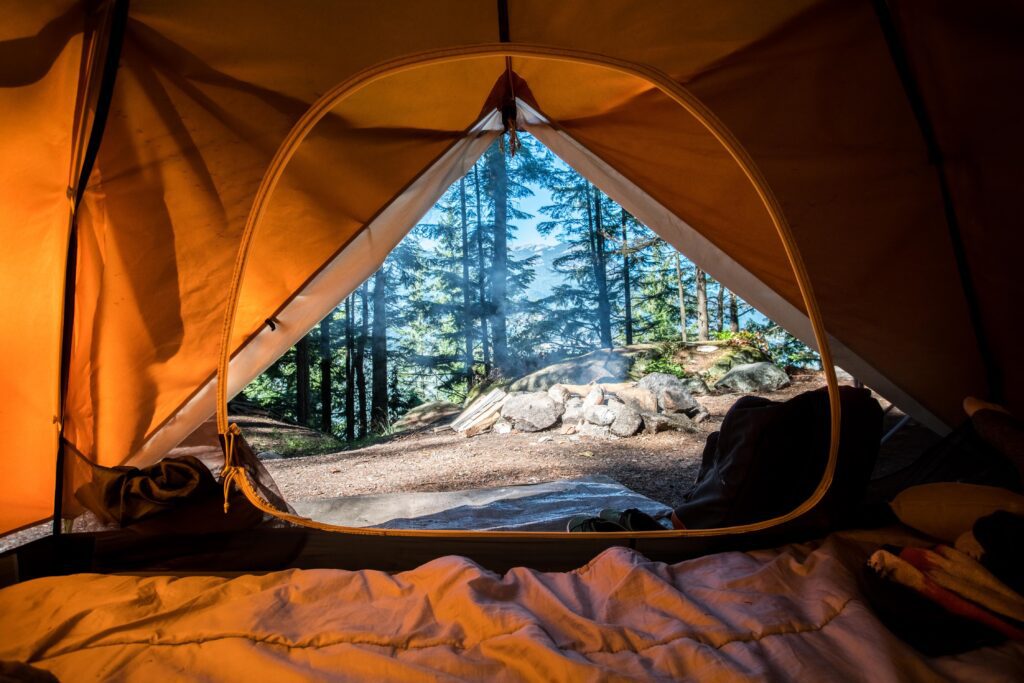
Photo by Scott Goodwill
Whether you’re seeking convenience, immersion in nature, or a balance between the two, examining the pros and cons will guide you towards the camping style that best suits your needs and enhances your outdoor adventures.
Pros of SUV Tent Camping
- Versatility: SUV tent camping allows you to combine the benefits of car camping and tent camping, providing flexibility in choosing campsites and exploring different locations.
- Convenience: With an SUV tent, you have a designated sleeping area that is elevated off the ground, protecting you from uneven terrain, insects, and small animals.
- Mobility: SUV tent camping enables you to easily move from one location to another, allowing for spontaneous camping trips or the ability to explore multiple destinations during your journey.
- Weather Protection: SUV tents often come with sturdy materials and built-in features like rainflys and awnings, providing better protection against the elements compared to traditional tents.
- Enhanced Storage: SUV tents typically offer additional storage options, such as cargo areas or rooftop racks, allowing you to carry more camping gear and supplies.
- Quick Setup: Setting up an SUV tent is generally quicker and easier compared to traditional tent camping since you can take advantage of the vehicle’s structure for support.
Cons of SUV Tent Camping
- Limited Space: While SUV tents provide more comfort compared to traditional tents, they still have limited space. Sleeping and living quarters may be smaller, especially if you have a compact SUV.
- Vehicle Dependence: SUV tent camping requires you to have access to a suitable vehicle, limiting your camping options if you don’t own or have access to an SUV.
- Fuel Consumption: Carrying additional gear and using an SUV for camping can increase fuel consumption, resulting in higher costs and potentially impacting the environment.
- Reduced Privacy: SUV tents may offer less privacy compared to traditional tents since you are camping in a more exposed and visible area, especially if you’re in a crowded campground.
- Limited Seating: Depending on the size of your SUV, converting it into a sleeping area may reduce the available seating space, making it less suitable for larger groups or families.
- Difficulty in Remote Areas: SUV tent camping may have limitations in remote or off-road locations due to the vehicle’s capability and access restrictions.
Pros of Traditional Camping
- Authentic camping experience: Sleeping in a tent and cooking over a campfire create a more traditional and immersive camping experience, allowing for a deeper connection with nature.
- Cost-effective: Traditional camping generally requires a lower initial investment and has lower maintenance costs compared to SUV camping.
- Wide availability: Campgrounds and established camping areas are more widely available, providing amenities such as toilets, showers, and sometimes recreational facilities.
- More space for recreation: Tents offer dedicated sleeping areas, allowing for more space within the campsite for recreational activities or relaxation.
Cons of Traditional Camping
- Limited accessibility: Traditional camping often requires hiking or carrying gear to the campsite, which can be challenging and time-consuming, particularly for individuals with physical limitations.
- Weather-dependent: Traditional camping is more susceptible to the effects of inclement weather, and the camping experience may be impacted by rain, wind, or extreme temperatures.
- Lack of security: Sleeping in a tent may feel less secure compared to an SUV, as it offers less protection from wildlife or potential intruders.
- Less convenience: Setting up tents, carrying camping equipment, and using communal facilities may require more effort and planning compared to SUV camping.
Comparison Table of Pros and Cons of SUV Tent Camping and Traditional Camping:
To assist you in making an informed decision about the ideal camping style for your outdoor excursions, we present a comprehensive comparison table highlighting the pros and cons of SUV tent camping and traditional camping.
This table offers a concise overview of the advantages and disadvantages associated with each camping style, allowing you to assess the key factors that may impact your camping experience.
| Aspect | Pros of SUV Tent Camping | Cons of SUV Tent Camping | Pros of Traditional Camping | Cons of Traditional Camping |
|---|---|---|---|---|
| Location | Access remote and off-road areas | Limited to areas accessible by SUV | Connect with nature in natural settings | Limited to designated camping areas |
| Accessibility | Easy mobility and ability to explore multiple destinations | May require hiking or carrying gear to areas which the SUV can’t travel. | Freedom to choose any camping location | Access limited by physical ability |
| Equipment | Enhanced storage options for carrying camping gear and supplies. | Limited space for equipment storage | Wide range of camping equipment options | More extensive setup and breakdown |
| Comfort and Convenience | Ample storage space and convenience | Limited interior space for sleeping and living. Limited privacy as SUV tents are more exposed and visible | Immersive outdoor experience | Basic amenities and facilities |
| Shower and Bathroom | Potential for limited or no access to shower and bathroom facilities | Dependence on campground facilities for shower and bathroom | Access to campground facilities for shower and bathroom | Limited availability or quality of facilities |
| Activities and Entertainment | Easy access to outdoor activities. Versatility in outdoor and indoor activities | Limited to immediate surroundings or amenities, particularly in remote or off-road areas. | More opportunities for outdoor recreation | Weather-dependent activities |
| Cost | Potential long-term cost savings compared to other camping methods. | Additional expenses for modifications and equipment | Lower initial investment and maintenance costs | Limited amenities and facilities |
Choosing Between SUV Camping and Traditional Camping
When it comes to choosing between SUV camping and traditional camping, there is no definitive answer. The decision depends on your personal preferences, priorities, and the type of camping experience you seek.
SUV camping offers greater mobility, access to remote locations, and a higher level of convenience and security. On the other hand, traditional camping provides a more authentic and immersive experience, allowing for a deeper connection with nature and the flexibility to adapt to different camping environments.
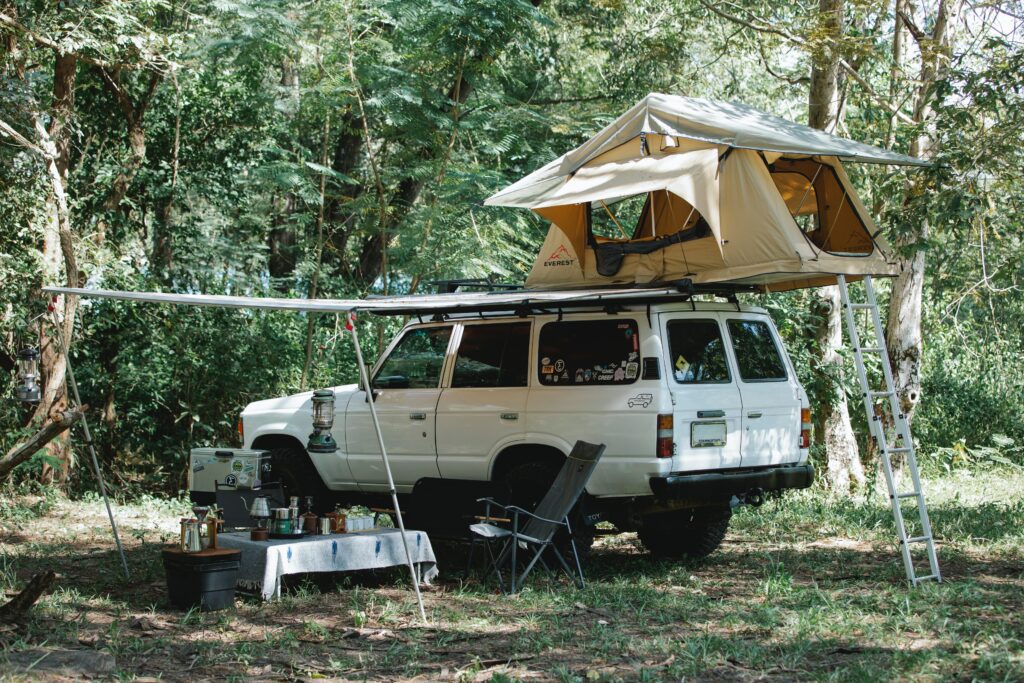
Consider factors such as location preferences, the level of comfort and convenience desired, the activities you plan to engage in, and your budget. If you value flexibility, easy access to off-road locations, and the convenience of having ample storage space, SUV camping may be the right choice for you.
On the other hand, if you prioritize a more traditional camping experience, enjoy setting up tents, and prefer the ambiance of campfires, traditional camping is likely the better option.
Ultimately, both SUV camping and traditional camping offer unique advantages and can provide memorable outdoor experiences. Consider your preferences, needs, and available resources to make an informed decision and embark on a camping adventure that suits you best.
FAQ
Q: Is SUV tent camping more expensive than traditional camping?
A: Yes, SUV tent camping generally requires a higher initial investment due to the cost of purchasing or modifying an SUV for camping purposes.
Additionally, ongoing maintenance and upkeep costs for an SUV can be higher compared to traditional camping equipment. However, it’s important to consider the long-term utility and versatility of an SUV beyond camping.
Q: Which camping style offers more comfort and convenience?
A: SUV camping offers greater comfort and convenience in terms of storage space, security, and accessibility. With ample storage space in the vehicle, it’s easier to organize and access camping gear.
Additionally, sleeping inside the SUV provides shelter and protection from the elements and potentially dangerous wildlife. However, traditional camping allows for a more authentic and immersive experience, connecting you directly with nature.
Q: Can I engage in the same activities with SUV tent camping and traditional camping?
A: Both SUV camping and traditional camping offer opportunities for outdoor activities such as hiking, fishing, and enjoying nature. However, SUV camping provides greater flexibility for off-road adventures and exploration of remote areas.
Traditional camping may be limited to the immediate surroundings of the campsite or the amenities offered by the campground. It’s important to consider your preferred activities and the level of mobility and access you desire.
Q: Are there shower and bathroom facilities available in SUV camping?
A: SUV camping may have limited or no access to shower and bathroom facilities. This is because SUV tent camping often relies on portable options or campground amenities. Traditional camping, on the other hand, typically provides access to campground facilities for showering and bathroom use.
However, it’s important to note that the quality and availability of these facilities can vary depending on the campground.
Q: Which camping style is more suitable for families?
A: The suitability of SUV camping or traditional camping for families depends on various factors. SUV camping can offer the convenience of ample storage space for family gear and the ability to access remote locations.
Traditional camping, on the other hand, provides a more traditional and immersive camping experience that some families may prefer. Consider the needs and preferences of your family members, the level of comfort required, and the desired activities to make an informed decision.
Q: What are the advantages of traditional camping over SUV tent camping?
A: Traditional camping offers a more authentic and immersive experience, allowing you to fully connect with nature and enjoy the ambiance of campfires and tents. It also generally has lower initial investment and maintenance costs compared to SUV camping.
Additionally, traditional camping provides access to established campgrounds with amenities such as toilets, showers, and sometimes recreational facilities.
Remember, the choice between SUV camping and traditional camping ultimately depends on your personal preferences, needs, and the type of camping experience you desire.


